Previous post
Now reading
Grief, Loss…and a Pandemic
Next post

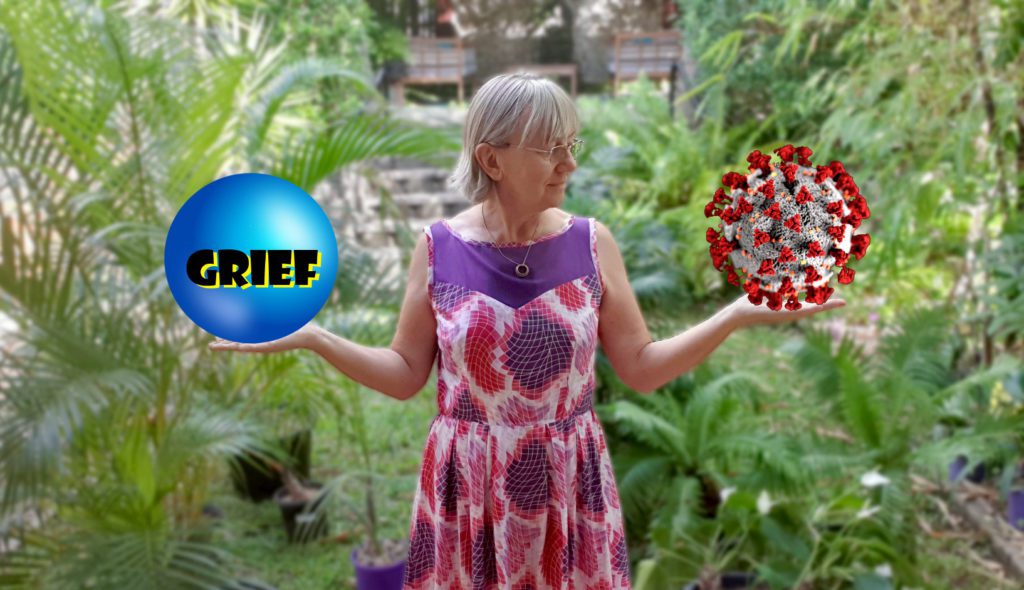
I wasn’t planning on writing anything about the COVID-19 global pandemic because… well….I’m more focussed on surviving grief and the loss of a loved one, and how to deal with that kind of personal nightmare. But then all of a sudden the penny dropped.
“You idiot!” I said to myself while rolling my eyes and smacking my forehead, “The whole WORLD is grieving!!!!”
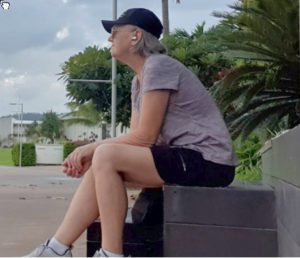
As a widow who lives alone, I’m actually doing OK through this global upheaval, and when others ask how I’m coping, I say “I’m fine. I’ve had some practice.”
This is because I already know what it is like to have everything you thought you knew, snatched away.
Over time I’ve developed coping mechanisms and I’ve made a list of 6 of these which have particularly helped me. I thought I’d share my list as it might help others. 💔
During this time of a global pandemic, many people are grieving specific losses such as having their dream holiday cancelled or being able to cuddle a new grandchild, but in fact what everyone is really grieving about is the loss of what each individual thinks of as ‘normal‘.
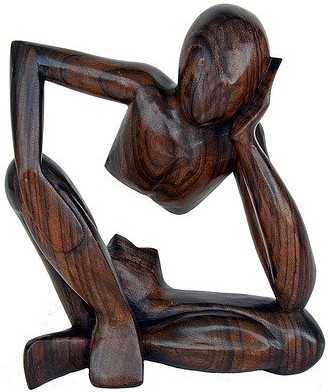
People are grieving for loved ones they can no longer hug. Grieving for the loss of a sense of security and safety. Not to mention, profound loss of that comfortable feeling inside that makes you think “I’ve got this…I understand my world….I know what is coming next”.
Except then it turns upside down and everything you thought you knew and understood about yourself, your life your work, your community, is suddenly gone and the rug is pulled out from under you. Scary stuff.
So here’s my list. I’ve tried to explain what has helped me while grieving the loss of my husband (especially at the beginning) and also how I’ve extended it to help me cope during the pandemic and subsequent self-isolation.
* Click/tap on the headings below to reveal the pearls of wisdom 😋
Yeah, I know there’s a lot of talk about gratitude these days, and the down side is that doing something like keeping a Gratitude Journal is starting to be seen as trendy and fashionable. Trust me on this though….it works. Very much so.
At the beginning:
I remember when just opening my eyes in the morning (assuming I had slept at all) would invite the nightmare into each new day. When realisation of the hard reality of Norbert’s death would consume me, causing a new flood of sobs that tore at me, and made me physically unable to get out of bed.

It began as a survival mode thing, but it turned into a habit – as soon as I was awake I would say (out loud) “Good morning world”. Then I would make myself smile (which probably looked like a forced grimace but hey…I was trying).
The final, important step was that I told myself I had to come up with ONE thing that I was grateful for. Oh, gee that was a tall ask but I could usually think of one thing…like….”I am grateful for friends who are doing their best to support me”. On a really bad day it might be just “I am grateful for coffee” or something equally ground-breaking.
I know it sounds silly, but so many scientific brainiacs have proved the truth of it…. that it actually changes the way your brain works.
“…at the neurochemical level, gratitude acts as a catalyst for neurotransmitters like serotonin, dopamine, and norepinephrine – the ones that manage our emotions, anxiety, and immediate stress responses..”
The Neuroscience of Gratitude and How It Affects Anxiety & Grief
Nowadays:
M mornings are no longer the living nightmare they were at the beginning but I have kept up this habit and it’s holding me in very good stead for my mental health during these difficult times too.
This morning I said “I’m so thankful for the technology that allows me to still talk to people, and to be able to give virtual hugs to everyone who needs one“.
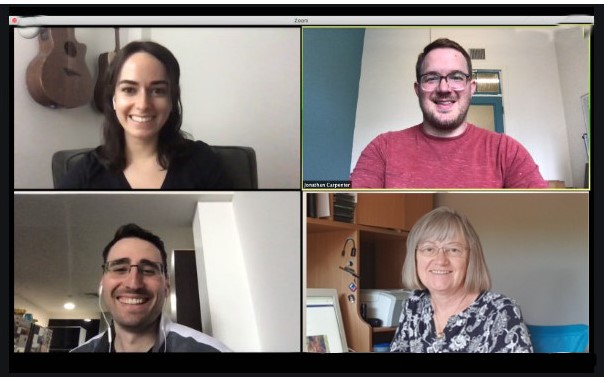
If you’d like to try this ‘gratitude thing’ but need ideas, start here:
13 Most Popular Gratitude Exercises & Activities
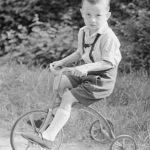
Soon after we met, Norbert told me a story of when he was a little boy living in Berlin. He would ride his bicycle around the block every day, but one day some men in uniform stopped him and told him to go home. He noticed they were building something at the end of his street. It was the Berlin Wall.
Right now we see bold headlines calling these ‘unprecedented times’….but are they? Maybe they’re just unprecedented for us.
At the beginning:

On the day Norbert was killed, it felt like nothing would ever be normal again. At the time I likened it to opening a familiar door, only to be confronted with a menacing fog that swirled in front of me, blocking my vision and wrapping icy fingers around me.
Time doesn’t heal per se, however it does smooth out the rawness and life begins to feel just a little kinder after a while. I railed against and fought so much at the beginning of my grief journey including my loss of self-identity.
Turns out acceptance was key for me, and I found that when I stopped screaming “WHY!!!” and “IT’S NOT B+%^&* FAIR!!!” into the wind, I began to heal.
Nowadays:
It is what it is. The world has been suddenly upended because of this virus and lives and economies are at risk. But….can I change that? Nope. I think the well-known ‘Serenity Prayer’ pretty much says it all.

I can change my small world, plus I can change my attitude to what is happening in the bigger world…and that is enough.
I choose not to read sensationalist news or mainstream TV media, and all the Facebook doom-sayers and keyboard conspiracy theorists have been blocked from my Newsfeed.
Instead, although I have continued my habit of meditating to deal with depression and anxiety I have temporarily increased my sessions so that I am helped into a calm place on a daily basis.
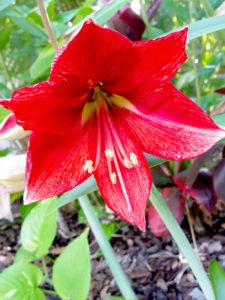
Nature is a wonderful healer, and one of the truly positive things from this pandemic is that nature is starting to heal as well. I have heard that birds are returning to now-quieter suburbs and pollution is receding. All good stuff.
Nature is also a good healer of mental-health and an individual’s ability to cope with what life throws at you.
Back at the beginning:
Just moving seemed a huge physical effort and there were many days that (even though I made myself get out of bed), I didn’t move off the lounge. It all seemed so pointless and a massive effort. I am lucky to have a lot of greenery in my backyard though, so fairly early on I would at least attempt to get myself outside into the sunshine, walking around and trying to notice details like flowers and butterflies.
On one memorable day my garden helped me to discover the concept of Flow, which I found was a much-needed way to have a break from the pure exhaustion of grieving.

Nowadays:
Again I am lucky that where I live we are not in total lock-down but are still able to leave the house for exercise, providing we stay close to home and are strict with social-distancing.
“We researched the links between nature and urban residents’ well-being and found there are benefits of nature that we can still enjoy now, even in lockdown.”
3 Ways Nature in the City can do you good even in self-isolation
I have been heading out early almost every morning for a walk. I aim for green spaces wherever possible, but even when grey streets are all that is available, I try to make a point of looking up and seeing beauty in the pink-tinged clouds and golden filaments of sunshine as they begin to warm my surroundings.
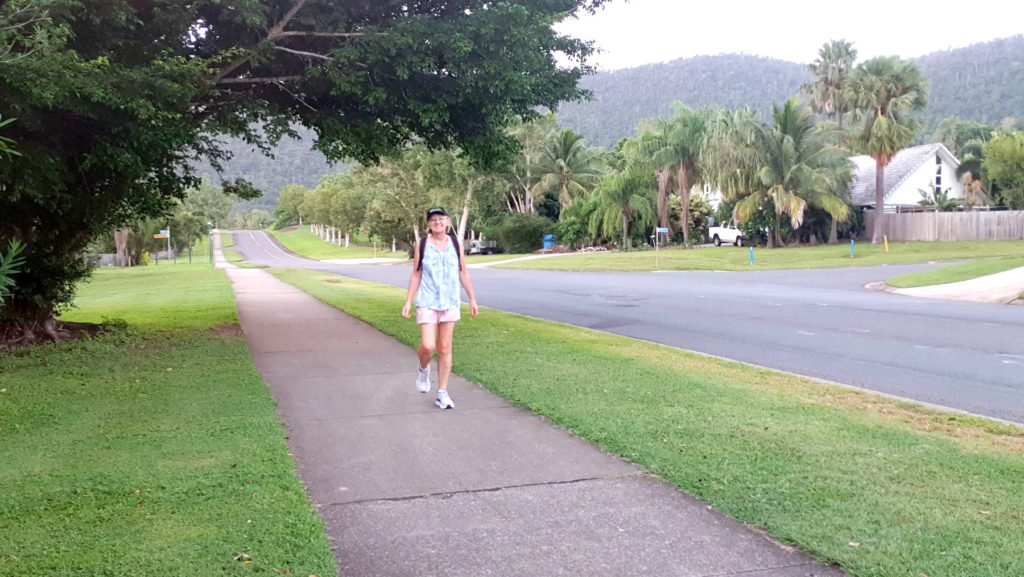
I’ve written about self-care before, but I can’t stress how important it is, especially now! I was brought up to believe that it is very self-centred to put yourself first, and being a ‘good person’ meant always looking after the needs of others.

Sorry Mum, but that’s a load of …umm…hoo-har. 😋 😂 🤣
To use the analogy of a bucket with holes in the bottom, if all your time and energy is pouring out of the holes faster than you can replenish the bucket, then everyone suffers. Especially you.
At the beginning:
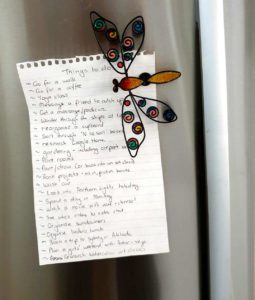
My bucket was completely empty…worse….just existing was sucking out the nothingness like a black hole sucks all matter.
I am lucky to have amazing daughters though and before they had to leave me to fly home after Norbert died, they cajoled me to help brainstorm a list of ‘what to do when you feel reeeally crappy’.
That list stayed attached to my fridge for over a year, and helped to break the paralyzing inertia that often seemed to overwhelm me because it gave me suggestions for what I could do to make myself feel better.
Nowadays:
All of the local massage places are closed of course, which is a nuisance as that is always my go-to for when I need some stress relief or just some good feelings, however I pride myself on being creative so I haven’t let that stop my quest for self-care!
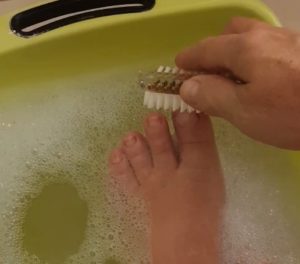
Last night I dragged a tub of scented water into the lounge (trying very hard not to slosh it everywhere) and, with scented candles around me, I gave myself a pedicure while enjoying a glass of wine. And tonight I’m going out for dinner.
“What! How can you do that?” I hear you say. Well, I’ve ordered a nice meal from a local restaurant that delivers, and when it arrives I will transfer it to my best china, take it out (to my patio), set the table and eat it in style.
I figure what I saved on the pedicure I can spend on the meal. 😉
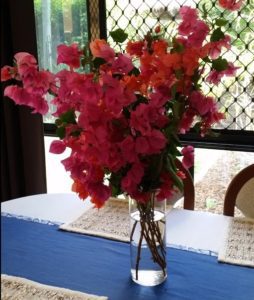
This sounds very grandiose, but creating or inviting beauty into your life can be as easy and relaxing as watching a beautiful sunset, or as simple as picking a colourful bunch of flowers to bring inside and display on your kitchen table.
That said, it is hard to come up with suggestions for others as finding or creating beauty is such an individual thing. When you have created something beautiful (maybe a craft item or a neatly planted vegie garden), it just…well….gives you a good feeling. Likewise, listening to beautiful music can do that, or watching a bee busily working. Do you get the idea?
At the beginning:
Learning to appreciate (and notice) beauty was something I gained gradually through the mindfulness of meditation, but getting that feeling from being creative myself? Woah….much more of a challenge.
Being such a Type-A personality means I am very self-critical so just immersing myself and enjoying a process rather than striving for perfection is still an ongoing challenge for me. I need everything I do to be perfect. Yes, that’s realistic, isn’t it!! [rolls her eyes]

It started the day I picked up a paintbrush and got out some watercolours. “Good therapy” the psychologist had said encouragingly , but it wasn’t an easy road for me although I have persisted.
Nowadays
The pandemic and cancellation of all my usual activities (holidays etc) has meant more spare time. I’ve taken all pressure off myself to paint anything remotely ‘artistic’ and am just doodling and painting some of my memories…and I’m enjoying myself.

I’ve even begun hanging them on a wall to create my own Art Gallery! If Norbert was watching me bang nails in the wall he was probably shuddering as I’m clueless with tools…. but I think he would be happy to see me create my own display.
I also subscribe to Facebook groups where I can view the work of those much more talented than me, and marvel at the beautiful paintings they create. It’s all about immersing myself in what I find beautiful.
But finding your own version of beauty is the important thing, and that is different for everyone.
If there is one thing that a global lock-down had the potential for, was that it could have disconnected society. That hasn’t happened though, as so many are ‘leaping (technical) buildings in a single bound’ to try and connect with family and friends.

People are getting onto Zoom, WhatsApp and Messenger and enjoying virtual coffee and Happy Hour with friends and family…perhaps even more frequently than they would have previously! 😃
I believe this proves that despite everything, people need people. We don’t do isolation very well at all so maintaining connections and reaching out to others is sooooo crucial, especially now.
At the beginning:
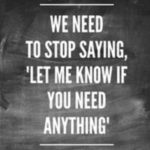
At the beginning of my grief journey I definitely needed to be on the receiving end of staying connected, as there was no way I could reach out. All those people at Norbert’s funeral who said “Call me if you need anything” never heard from me because I just wasn’t able to do that. Luckily I had some great friends who did the reaching out until I was emotionally strong enough to start doing it myself again.
Complete self-isolation isn’t a healthy thing though. It’s OK to want to ‘stay in your cave to lick your wounds’, but doing this is not a permanent escape from reality. Back then I slowly began to accept the invitations offered…and that was a good thing.
Nowadays:
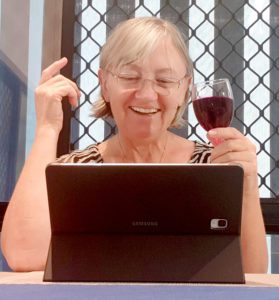
Every morning (after I’ve greeted the world and answered my ‘gratitude question’😊) I ask myself “Who will I connect with today?”
As someone who lives alone I perhaps feel the self-isolation more than those with partners as, apart from my Google Assistant there is no other voice in the house.
I can also empathise with others in similar circumstances, and…like my dear friends did at the beginning of my grief journey….nowadays I purposefully reach out to those I know who might appreciate the contact.
So every single day I make a phone call, or send a text message, or organise a video chat with at least one friend or family member, particularly if they live alone. I’d like to think it helps them….and it definitely helps me.
I’m horrified at the length of this post! Despite my attempts to prevent it becoming a scrolling nightmare, it has turned into an extremely lengthy read. Sorry ’bout that. 😘 I guess trying to cover coping mechanisms for grief in two disparate…but comparable… situations was never going to be brief.
These have been MY coping mechanisms though, and I would just love it if you would click the Comment link below to share your own.

One day we will look back on COVID-19 as something in the past. That’s the big difference with grieving the loss of a loved one though, as it’s forever. The coping strategies have to last a lifetime and not just a few weeks or months.
Hang in there. We’ll make it. ❤️
Marlene is an Australian widow who has written about all the good, bad and ugly stuff that happened after her husband Norbert died tragically. Marlene responds to all comments.
I’m not sure we ever come out of grief unchanged. Yes, fortunately the COVID-19 disruptions will come to an end and return to ‘normal’, but what will we (personally and as a society) be like? I think there will be changes – obviously not as drastic as the death of someone close to us, but my hope and prayer is that from the forced dismantling of the walls of our life ‘trenches’, some new awareness will have sparked. So my coping mechanism is definitely Hope.
This is an excellent list. All of the suggestions are useful, practical and attainable. Thank you Marlene.
Hi Marlene,
I think we both were going to take the Rocky Mountaineer trip from Vancouver to Calgary in late August. There hasn’t been a cancellation yet but we are planning to postpone it to the same time next year. What are you planning?
I’ve been working in my garden during the isolation and enjoying the beauty it provides. My husband passed away 20 years ago so I’ve definitely lived through those difficult first years after his death. I’ve actually survived, but there isn’t a day that passes that I do not fondly think of him and the life we had together. I’m still in our same home and I love to do things around here to make it mine.
All your isolation suggestions are right on and help make the time pass with purpose. Do take care! I love reading your posts.
6 Comments